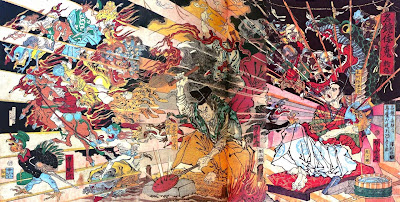My abridged copy of 1001 Nights is filed with dubious Victorianisms, but every once in a while it just really comes together. The genie Al-Ra’ad Al-Kasif to the puckishly homocidal fisherman Judar:
So now I’m thinking about summoner types again. The last iteration was a bit too complicated and wasn’t quite doing what I wanted it to do. Here is yet another iteration, one that’s probably pretty close to complete, incorporating some advice from +Arnold K.
 |
| by Kawanabe Kyōsa |
HP, XP, Saves as magic-user
Summoners cannot perform magic under their own power, and instead call forth spirits to do it for them. First, a summoner must acquire the true name of a spirit. They can do this by finding it while adventuring or extracting it from the spirit itself, through trickery, violence, or diplomacy. Then, they must bind it. This is analogous to a magic-user preparing spells; the spirits a summoner has bound determines which ones they can summon over the course of a day. Finally, they can summon the spirit, which requires the traditional Loyalty roll (2d6 under a target number between 3 and 12).
At midnight, summoners can bind spirits whose true names they know. This takes as long as a magic-user memorizing spells from a spell book. Bound spirits, whether they are currently summoned or not, count against a summoner’s retainer total (if applicable to your rules of choice. Otherwise, they can bind a number of spirits equal to half level+Cha mod).
Summoning a spirit takes as long as casting a spell. When you summon a spirit, make a Loyalty check to see if you retain control of it. A spirit’s base Loyalty is increased by 1/3 your level (if your ruleset of choice does not provide a method for retainer loyalty, start it at 6) If you succeed, the spirit performs a single task for you to the best of its ability, then returns to the void, ready to be summoned again. If you fail, the spirit is free to do as it pleases until you subdue it or bind it again. Malicious spirits will attack you or otherwise sabotage your progress, while benign or neutral spirits will just leave or watch you get eaten by skeletons.
- If you command a spirit to cast a spell, add the spell level to the 2d6 roll.
- Spirits commanded to perform exceedingly long-terms tasks might require multiple Loyalty rolls. A spirit commanded to guard its summoner for an entire day would require Loyalty rolls every time it sustained significant damage, for example.
- For every spirit you have currently summoned, you suffer a -1 penalty to Loyalty rolls.
- Spirits have their own motives and personalities. If you command a spirit to act against its truest nature, you suffer a -1 to -3 penalty to the Loyalty roll, depending on how egregious the breach of its code would be.
- You can gain a +1 bonus to a single Loyalty roll by giving the spirit an offering. This can be anything from a bottle of rum to a live goat, but the upshot is a single offering encumbers at least as a significant item and costs at least 50gp×the spirit’s HD.
- A summoner can banish any spirit under their control at will, but they must be in earshot.
- Spirits that die return to the void, and cannot be summoned until bound again.
Example Spirits
Inklings
 |
| from legend of zelda: wind waker |
Spirits of hexed ink and sublimated shadow, about as intelligent as a human toddler. They possess a catlike susceptibility to affection, but also delight in cruelty.
Stats: As goblin
Can spider-climb and squeeze through spaces coin-sized or larger. Inklings take d4 damage per turn in lightless environments are their substance bleeds off into the ambient darkness.
 |
| from dark souls 2 |
Agrode
A crow the size of a mastiff. She has many red eyes, and speaks through the small human face hidden inside her beak. She is obscene, manic, funny, and enthusiastically anthropophagous. Agrode holds power over sight and thought.
Agrode adores children, and most commonly comes into conflict with humans when she starts kidnapping sons and daughters. Despite the fact that she is a giant, filthy, demonic crow, she actually takes quite good care of them, loving them with all her evil heart and teaching them all the secrets of her wicked wisdom. Some of the greatest witches in history were raised by Agrode. Occassionally, desperate parents leave their children out where Agrode is known to roost. She gratefully accepts them, then kills the parents for neglect.
Stats: As giant bat, no blood drain, Alignment is Chaotic
Can cast Comprehend/Obscure Languages, Phantasmal Force, and Forget at will. She can cast Charm Person at will, but only on those below the age of 18.
 |
| from final fantasy xii |
The Queen of Lions
The spirit of the Queen of Sheba’s consort. Her features are concealed behind red lacquer armor and samite, but she stands a full head taller than the tallest man. She is taciturn, patient, suspicious of magicians, and wrathful towards liars. Hers are the powers of fortitude and purity.
Stats: As Ogre, Alignment is Lawful, cannot be harmed by man-made weapons
Can Turn Undead as a 3rd level Cleric, can speak to animals
Al-Ra’ad al-Kasif
 |
| from tales of vesperia |
An ifrit, once immensely powerful, now sadly dissipated. He appears as a louche, middle-aged man in rich clothes. He is a knowledgeable accountant and talented lawyer, though leaving him to his own devices in financial matters is not necessarily wise, as his reach exceeds his considerable grasp.
Al-Ra’ad is a traditionalist djinn, and does not try to push too hard against his summoner’s orders. However, he desperately wishes to repair his ring, broken millennia ago by the wife of an old master, in hopes of restoring his former power. He is also a gourmand and a minor alcoholic, and his appetites occasionally surpass his best efforts and good intentions.
Stats: As Gnoll, Alignment is Lawful
Can Change Self at will. Al-Ra’ad is abnormally strong, and can carry twice as many items as normal. He can easily perform any feat of Strength a normal human is capable of, and automatically succeeds all such Strength checks. He only makes checks for tasks that would exceed the capabilities of a single person.

Good, good stuff. They're all evocative, and all very distinct in design and usage. I especially like Agrode (partly because I think she'd be both hella fun and hella easy to roleplay).
I was reading this thinking it felt very much like reading Goblin Punch, (one of my favourites and look who has chimed in to say he likes it). Good stuff, especially the Agrode and wish I ran a fantasy setting just so I could use this.
I think is better than the previous versions. Still, I would add a bit of the previous options for pleasing patrons (sacrifices, offerings, sidequests). To remind the players their power is not for free.